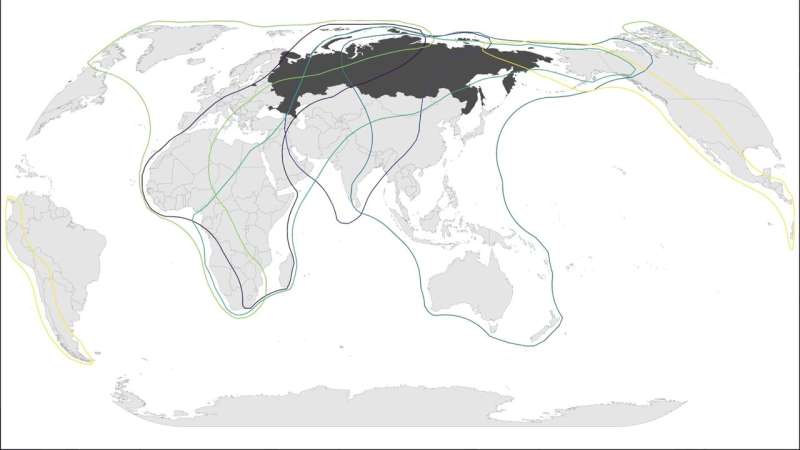Russia-Ukraine war has global impacts on conservation research

The war in Ukraine and the international isolation of Russia has harmed biodiversity conservation according to a new study published in Frontiers in Conservation Science. The international publication was co-authored by a University of Hawaiʻi at Mānoa researcher.
Conservationists who monitor migratory species, such as the kohalā (humpback whale) and kōlea (Pacific golden plover), must rely on a worldwide network of like-minded scientists, governments and organizations to collect wildlife data; however, the conflict between Ukraine and Russia has made research difficult.
“The exchange of knowledge is impacted since international scientific partnerships no longer have the input of Russian funding or Russian expertise—and vice versa,” said Melissa Price from the UH Mānoa College of Tropical Agriculture and Human Resources’ Department of Natural Resources and Environmental Management.
“Collaborative projects are on hold, such as in the Arctic as well as a number of studies on migratory birds, whales and other species that spend part of their time in waters off the coast of Siberia, other times moving across the Pacific Ocean to the tropics or North American continent. It’s also impacting the lives of exchange students, post-doctoral fellows and visiting researchers.”
Price participated in the study as then-chair of the Global Policy Committee of the Society for Conservation Biology, an international organization dedicated to advancing science and practice of conserving Earth’s biological diversity. She is especially concerned about the far-reaching consequences for nature conservation, such as loss of habitats and species extinctions.
Impacts on biodiversity research
As a result of the Russian invasion of Ukraine, satellite tracking of animals through the International Cooperation for Animal Research Using Space (ICARUS), a global monitoring system for animals, has been disrupted. ICARUS relied on the Russian space agency, which ended data sharing on March 3, 2022.
“We think of war as a political action, but it has huge biodiversity implications,” Price said. “When species move between arctic and tropical waters, we require large international alliances to track, study and conserve them.”
Russia’s isolation has also disrupted ongoing environmental negotiations, delayed international cooperation on environmental matters and abruptly changed international and domestic policy priorities, according to the study.
The Russian suspension from the Society for Worldwide Interbank Financial Telecommunications system has limited international assistance for migratory species conservation projects in Russia, which have halted ongoing on-the-ground efforts for many threatened species that breed in Russia’s Far East and migrate to Southeast and South Asia. Additionally, food security for humans has taken precedence, forcing the European Union to relax biodiversity conservation policies in order to intensify agricultural efforts and address food shortages.
“Ultimately, how the war may affect other institutional arrangements beyond those we have showcased here, how international cooperation may continue amidst the war, how cooperation may be restored wherever lost, and what measurable impacts on the ground the war can have beyond Ukraine due to shocks to governance, remain matters warranting scholarly attention,” wrote the international team of authors for the article.
The full article, “Implications of Russia’s invasion of Ukraine for the governance of biodiversity conservation,” appeared in the February 15 issue of Frontiers in Conservation Science.
More information:
Eduardo Gallo-Cajiao et al, Implications of Russia’s invasion of Ukraine for the governance of biodiversity conservation, Frontiers in Conservation Science (2023). DOI: 10.3389/fcosc.2023.989019
Citation:
Russia-Ukraine war has global impacts on conservation research (2023, February 20)
retrieved 20 February 2023
from https://phys.org/news/2023-02-russia-ukraine-war-global-impacts.html
This document is subject to copyright. Apart from any fair dealing for the purpose of private study or research, no
part may be reproduced without the written permission. The content is provided for information purposes only.
For all the latest Science News Click Here
For the latest news and updates, follow us on Google News.

